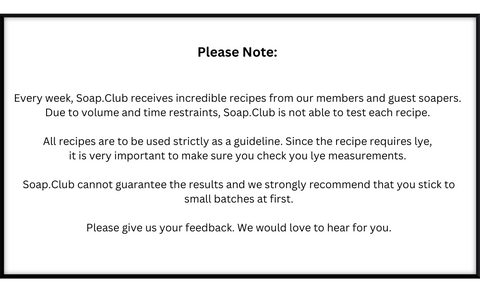Rose Natural Soap Bars: Handmade To Pamper You - Soap.Club
Posted on March 15 2023
Rose Scented Handcrafted Soap
If you're looking for a natural soap bar that's both gentle and effective, rose soap is a great option. Rose soap is made with real rose petals and has a light, refreshing scent. It's perfect for people with sensitive epidermis and has been known to help reduce redness and inflammation.
Keep reading to learn more.
Table of Contents
- The History of Using Roses in Various Products
- Explore The Benefits of Handmade Rose Scented Soap
- Rose Petals for Gentle Exfoliation
- Tips On Using and Making Handmade Soap Bars with Essential Oil
- What Is Saponified Oil?
- Frequently Asked Questions
- Conclusion
The History of Using Roses in Various Products
Roses have long been prized for their beautiful, romantic appearance and as a source of fragrance. In fact, the use of roses in beauty products can be traced back to Ancient Rome, where both men and women used fragrant rose petal oils.
Since then, roses have been used in everything from perfumes to lotions, soaps, face creams, and shampoos. Today, they are still often found in high-end cosmetics, but you can also find a variety of rose-based products available at lower price points that are just as effective.
As an added bonus, some studies show that specific components of rose essential oils may have anti-inflammatory properties that could soothe irritation and even speed up healing time after surgery. So while roses are beautiful enough to use solely for decoration, they're also more helpful than one might realize!
Explore The Benefits of Handmade Rose Scented Soap
Rose natural soap bars bring you all the beauty and benefits of roses nourished by nature. Crafted with a generous blend of plant-based oils like olive and coconut oil, and for gentle cleansing, hydrating shea butter and antioxidant-rich rosehip oil to moisturize and protect your epidermis from environmental stressors.
These wonder soap bars also contain rose essential oil – known for having anti-inflammatory properties that contribute to its calming effects on the skin. Pamper yourself with natural goodness as you treat yourself to these luxurious soap bars enriched with purifying properties that bring out a healthy luster in your skin.
Rose Petals for Gentle Exfoliation
Soap.Club rose natural soap is the perfect addition to your beauty routine! Not only does it contain ingredients to help nourish and moisturize your skin, but it also has exfoliating qualities thanks to the addition of rose petals, pure sea salt, and ground oatmeal that you can purchase here to subscribe to our Monthly Soap Scent Spa.
Combining these three ingredients helps scrub dead cells while providing gentle exfoliation that won't irritate. Oatmeal adds more moisturizing properties, while rose petals promote natural oil production and protect against environmental stresses.
The infusion of pure sea salt makes this soap ideal for those with acne-prone types since it can help absorb excess oils and unclog pores. With all these beneficial elements in place, Soap.Club rose natural soap provides a luxurious pampering experience, leaving your epidermis softer and healthier than ever!
Tips On Using and Making Handmade Soap Bars with Essential Oil
Taking good care of handmade soap bars makes them last longer. To get the most out of your soap bars and make them long-lasting, follow the suggestions below:
- Store handmade soap bars in a cool, dry place away from direct sunlight. This will help keep them well-protected and reduce their risk of breaking or melting too quickly.
- Keeping the soap bar off overly humid surfaces can also go a long way in prolonging its duration.
- Additionally, allowing the bar to air dry after each use can help keep it firm and prevent it from becoming mushy or slimy.
- Finally, if you don't want your soaps for yourself, consider giving them as gifts to friends and family!
|
Envelope yourself with this dark and mysterious soap scrub, noted for its subtle rose-like floral fragrance. Blended with pure sea salt, ground oatmeal, and rose petals as exfoliants to gently revive the skin. |
If you want to try making your own soap, feel free to use our cold process soap recipe below, you can create your own rose soap at home and enjoy your favorite fragrance every day.
Ingredients
- 13 oz olive oil
- 5.25 oz hemp seed oil
- 7 oz refined coconut oil
- 4 oz soybean oil
- 3 oz grape seed oil
- 2 oz shea butter
- 2 oz cocoa butter
- 0.25 oz beeswax
- 13 oz distilled water
- 4.9 oz lye
- 1 oz patchouli essential oil
- Dried rose petals
Equipment
- Safety goggles
- Rubber gloves
- Wooden or plastic soap mold
- Large stainless steel or enamel pot
- Weighing scales
- Hand stick blender
- Two three qt size plastic pitchers
- Two thermometers
- Two wooden spoons
- Measuring cup, two or 3-cup size
- Freezer paper
- An old blanket or large rag
- A piece of cardboard cut to fit the mold as a lid
Method
1) Wearing your protective goggles and gloves, weigh the distilled water into one pitcher and the lye into another. Add the lye to the water, stirring continuously.
2) While the mixture heats up, weigh out the oils, butters, and beeswax and melt in a pot on the stove. Let the mixture cool to about 100 degrees F.
3) In the meantime, prepare your soap mold by lining it with freezer paper.
4) When the lye mixture has reached the same temperature as the oils, pour it into the pot of melted oils and butters and mix until you reach a light trace. Add the essential oil and continue to stir or switch to the stick blender.
5) When the mixture reaches a medium to heavy trace, pout into your soap mold and sprinkle dried rose petals in a layer on top, padding down a little.
6) Cover the mold with the lid and blanket and leave for 18 hours before removing the coverings and letting the soap air.
7) After a few hours, remove the soap from the mold and let it cure for at least two weeks on a drying rack or cut to size immediately.
Remember that the longer the soap cures, the better quality it should be.
What Is Saponified Oil?
Saponified oil is an epidermis-friendly, natural alternative to synthetically produced soaps and, therefore, free of harmful toxins. Instead of chemically blending hard alkali salts with fats or lipids, saponified oil involves blending oils with an alkaline ingredient, like coconut or olive oil.
This reaction causes a chemical reaction known as saponification, which converts the oils into a mild form of soap that can be applied directly to the face or body. Saponified oil has several health benefits;
- It cleanses well and is gentle enough for children and people with sensitive skin.
- Additionally, saponified oil contains no artificial ingredients and will not remove essential natural oils.
Saponification is used in various products, including soaps, shampoos, and laundry detergents.
It can also be used as an emulsifier in food items like chocolate bars or peanut butter. The process creates a new product with different properties than the original starting ingredients.
- For example, when saponified oils become more soluble in water than before, they lose their greasy feel.
- They also become milder and less likely to irritate.
- Finally, saponified oils create a rich, creamy lather often used in beauty products. Although saponification has existed for centuries, it remains a common process today.
- Saponified oils are beneficial due to their mildness, emulsifying capabilities, and lathering properties. Natural soaps made with saponified oil leave the face and body feeling clean and soft without causing irritation or dryness.
- Additionally, saponified oils offer excellent stability in creams, lotions, and other cosmetics recipes. This makes them suitable for moisturizers, shaving creams, and sunscreens.
- Saponified oil can also be an ingredient in DIY projects, allowing you to make your own soaps, shampoos, and other products.
Overall, saponified oils offer a variety of benefits both in commercial and homemade products. Whether you want to make soaps or other cosmetics, saponified oils can be an excellent option.
However, always follow the manufacturer’s instructions when handling any ingredient, including saponified olive oil. Additionally, if you are making products at home with this oil, it is essential to research beforehand to know how best to work with it safely.
|
If you don't feel like trying your hand at making your own soap, trying our soap bars is an opportunity you won't want to miss. They are packed with all-natural nourishing ingredients for which your epidermis will thank you. |
You'll love their light, natural scent, and the silky feel they'll leave. So don't wait any longer to give them a go - your new favorite soap bar could be around the corner! We'd love to hear what you think of them, so don't forget to leave us a review after trying one out.
Frequently Asked Questions
Is saponified oil safe?
Yes, saponified olive oil is a safe and natural ingredient that can be used in many products. The saponification process converts the fatty acids in the oil into soap molecules which makes it better for cleaning and does not leave an oily residue.
It also emulsifies, which is ideal for creams, lotions, and other cosmetics recipes. Olive oil is known to have many beneficial properties for body and face care, such as being rich in moisture and antioxidants.
Is Rose scent soap suitable for your face?
Yes, rose soap can be an excellent option for facial care. Rose petals contain many vitamins and antioxidants, which benefit the epidermis. The soap's natural oils will help provide moisture and nourishment while also cleansing it. Additionally, the gentle scent of the rose will refresh you after each use.
Is Rose soap good for oily skin?
Yes. The soap's natural oils will help balance the excess oil on your face and regulate sebum production. Additionally, the antioxidants in rose petals can help to protect your epidermis from environmental stressors and reduce inflammation. Rose soap is gentle enough for daily use.
Is saponified oil good for hair?
Yes, saponified oils can be beneficial for your hair. The molecules created by the saponification process are known to gently cleanse and moisturize your scalp and strands without stripping away their natural oils.
Additionally, saponified oils are rich in antioxidants and fatty acids that help to nourish and strengthen your hair from root to tip. It can also be a natural alternative to commercial shampoos and conditioners.
Conclusion
Rose natural soap bars make an excellent gift for any occasion or a luxurious treat for yourself. With an invigorating exfoliating action from the rose petals, pure sea salt, and ground oatmeal, your face and body will feel soft and silky after just one use.
And with many different scents available, you can purchase the perfect bar of soap to suit your mood. Give them a try today, and let us know what you think!
Alternatively, feel free to share your soap-making tips and tricks and don’t forget to check back to the Soap.club blog regularly for more great cold process recipes or contact us at soaplover@soap.club. Inspired by Rebecca’s recipe at http://soapdelinews.com/2013/08/natural-handmade-patchouli-soap-recipe-with-printable-cigar-band-labels.html.

You can learn a lot from our natural, organic handmade soaps on our blog here.
25 Amazing Uses and Benefits of Hemp Seed Oil
How To Use Essential Oil for Soap Making
Aloe Vera Soap A Step-By-Step Guide To Make Soap At Home
Best Organic Soap Base Our Complete Guide To Using Melt-And-Pour Soaps
7 Proven Benefits and Uses of Olive Oil Soap
What To Use Lavender For: 12 Things To Do With Lavender
Molding Soap: The Best (And Inexpensive) Soap Molds
Benefits Of Cold Process Soap-Making
Coconut Oil Benefits in Soap: Skin Nourishing Qualities
15 Amazing Benefits Of Shea Butter Soap
Soap Calculators: Lye Soap Recipes, SAP Values, and Formulations
Activated Charcoal Benefits in Soap for the Skin





Follow Us